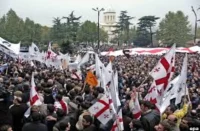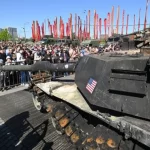Dismissed by some as a “non-event” back when it was first declared in mid-March, the self-proclaimed and Kurdish-led “Rojava – Northern Syria Democratic Federal System” is cancerously spreading across the Euphrates and linking up with YPG-occupied territory in the northwest of Syria. Unconstitutional political aspirants in that part of the country just announced that liberated Manbij will join the expansionist entity, confirming the worst fears of observers who have been diligently tracking the progress of the US’ latest scheme to carve a “second geopolitical Israel” out of “Kurdistan”.
Carving Out “Kurdistan”
Granted, the ‘compromise’ cover story that the US has spun to the world is the Syrian portion of this artificial territorial construction would be multi-ethnic and not “legally” controlled by the Kurds, though in practice, the reverse is actually true; pro-US Kurdish militias have been committing ethnic cleansing against native Arabs and Assyrians, and Kurds hold decisive power in this nascent “federation”. Turkey rightfully frets that this American-constructed geopolitical project will function as one giant safe haven for PKK fighters, and it identifies the “formalization” of “Rojava” as a dire threat to its national security and territorial integrity.
But Turkey isn’t the only one threatened by the US-supported rise of militant Kurdish nationalism in the region, since Syria is also at risk of being internally partitioned if this “federation” scheme succeeds. The PYD, the political arm of the YPG Kurdish militia, published a nasty, hate-filled “federalization” manifesto at the beginning of last year declaring their intent to topple the government in Damascus and “federalize” the entire country, essentially “Balkanizing” it into a patchwork of quasi-independent statelets along Washington’s new divide-and-rule model of Identity Federalism. More than likely, they plan to go through “democratic” motions in order to achieve international “legitimacy”, but if that fails, then the YPG will predictably resort to violence in preventing the Syrian Arab Army from carrying out a law-and-order campaign in disarming the group and liberating the occupied territory.
Iraq, too, is at risk of physically falling apart if the Kurdish Regional Government (KRG) in the north decides to declare independence, though this might not happen as soon as many people think because of the distrustful discord between several internal factions. Lately, the newest battleground for militant Kurdish nationalism has emerged in Iran, which has been under attack for the past month by cross-border “Kurdish Democratic Party of Iran” (KDPI) terrorists based in the KRG. The KDPI are accused of receiving Saudi support from the consulate in Erbil, and their leader just recently told the Israeli Jerusalem Post media outlet that his group and Iran’s arch foe share a “common enemy” in Tehran. During the interview, he also begged Tel Aviv for assistance in helping the KDPI achieve their own “federal” vision in Iran, too. Clearly, the Iranian Kurds – just like their Syrian brethren and others – are under heavy unipolar influence and are being used as geopolitical battering rams against the US’ enemies.
The Geopolitical Context Of The Pro-American Coup Attempt
It’s therefore established without a doubt that all four regional countries – Turkey, Syria, Iraq, and Iran – are being victimized by foreign-supported militant Kurdish nationalists, thus representing the most significant strategic denominator between them at this critical moment in the region’s history. The game-changing Russian-Turkish détente sets the stage for a regional ‘Concert of Great Powers’ to take on this challenge after the defeat of Daesh. It’s largely for this game-changing reason, as well as Turkey’s multipolar pivot, why the US gave the signal to commence the hasty, last-minute coup attempt against Erdogan. Washington hoped that the Gulenist network that had infiltrated the Turkish “deep state” (the permanent military, intelligence, and diplomatic bureaucracies) would succeed in pulling off the overthrow, and in the failed aftermath, they counted on Western media spinning Erdogan’s opportunistic purges as “evidence” that he “did the coup himself” in order to discredit the Turkish leader and make his new multipolar partners ‘guilty’ by association.
Russia’s “Lead From Behind” Coalition
In the face of the transnational militarized threat that unites each of them, the four relevant Mideast Powers are gravitating together under Russian leadership into an undeclared coalition against the US’ latest proxies. Their sovereignty-supporting efforts shouldn’t be conflated with “genocide” or being “anti-Kurdish” (although some of Turkey’s actions against civilians are indeed worthy of condemnation), but should instead be seen through the prism of a law enforcement operation aimed at disarming militant anti-government guerrillas. The coalition effort aims to dismantle the US’ “second geopolitical Israel” of “Kurdistan” and prevent the emergence of a new pro-American bastion in the heart of the Mideast, though lingering distrust between some of the members might create complications for joint efforts and pose a political obstacle to the official announcement of coordinated operations between them.
The only solution to these tactical impediments is for Russia to constructively apply the US’ “Lead From Behind” doctrine in multi-managing this regional coalition while maintaining a safe distance from the on-the-ground events that transpire. Moscow is the only government that’s on solid standing with all of the four Mideast states that are being targeted for dissolution via the “Kurdistan” project, so it’s only natural that it serves the role of intermediating in coordinating between each of them. More than likely, no formal declaration of an “anti-Kurdistan” (in the geopolitical sense) coalition will ever be made, though it could be strongly hinted at by the relevant countries’ publicly financed media outlets.
This would allow all sides to ‘save face’ in having to uncomfortably explain to their citizens why they’re cooperating with some ‘partners’ that were practically sworn enemies of their people until recently. It’s always extremely difficult for governments to explain policy pivots or pragmatic realignments (even temporary ones) to their publics, and in a context as polarizing and blood-soaked as the War on Syria, it’s perhaps better for all sides that their multilateral Russian-organized cooperation remain unofficial and ‘plausibly deniable’. Nevertheless, as Turkey, Syria, Iraq, and Iran each step up their campaign against the US’ geopolitical project of “Kurdistan”, it can be reasonably assumed that there’s an invisible Russian hand gently coordinating their broad regional activities (though except in instances when potential Turkish war crimes are being committed).















Pingback: Regional War Looms As “Kurdistan” Cross The Euphrates | Protestation
Pingback: APPAF Newsletter 07-25-2016 | APPAF
Pingback: Turkey Crosses into Syria: Unipolar Conspiracy or Multipolar Coordination? - The True News
Pingback: Turkey Crosses into Syria: Unipolar Conspiracy or Multipolar Coordination? | Counter Information
Pingback: Turkey Crosses Into Syria: Unipolar Conspiracy Or Multipolar Coordination? | Katehon | The Fourth Revolutionary War
Pingback: Reassessing The Reasons For The Failed Turkish Coup Attempt | Oriental Review
Pingback: Réévaluer les raisons de l’échec du coup d’État en Turquie | Réseau International
Pingback: Reassessing The Reasons For The Failed Turkish Coup Attempt | Réseau International (english)
Pingback: IRANIANS SHOULD BE THANKFUL FOR TRUMP – Ayatoilet
Pingback: Is The Tripartite Really On The Verge Of “Dicing Up” Syria? (I) | Oriental Review
Pingback: Sealing the Fate of Syria!
Pingback: Reassessing The Reasons For The Failed Turkish Coup Attempt | OrientalReview.org
Pingback: La Russie, l’Iran et la Turquie sont-ils sur le point de découper la Syrie? | Arrêt sur Info
Pingback: L’armée turque pénètre en Syrie… | Arrêt sur Info